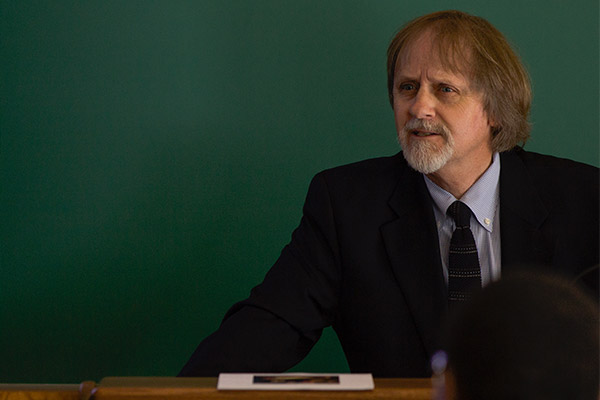The “Inside the PTS Curriculum” series gives you an inside look at what students are learning in their courses at Pittsburgh Theological Seminary. Each article focuses on one class, its subject matter, what students can expect to learn, the required texts, and the kinds of assignments students can expect. We’ll let you know whether the course is required or available for the Master of Divinity (MDiv), the Master of Arts in Pastoral Studies (MAPS), or Master of Theological Studies (MTS). Each article will include the professors’ bio.
This week’s course is: “Introduction to Caring Ministries”.
About Genesis through Esther
This term Pittsburgh Theological Seminary students will be learning about the Bible with Dr. Ron Tappy or Rev. Dr. Steven Tuell in the class “Genesis through Esther.” A required course for the Master of Divinity (MDiv), it also fulfills a requirement for the Master of Arts in Pastoral Studies (MAPS), and is open to students in the Master of Theological Studies (MTS) degree.
“Genesis through Esther” offers an introduction to the first five books of the Bible (the Pentateuch or Torah) and the Historical Books (Former Prophets) of the Old Testament. Students in this course get to explore the factors that gave rise to and helped shape this material. The course also addresses the specific content of these books and their various literary genres. Drs. Tappy and Tuell address methods used in the interpretation of Scripture (source, form, redaction, literary, socio-cultural, canonical, and rhetorical criticism) and the applicability of archaeological data in reconstructing the ancient world in which the texts arose. The goal, of course, is to seek a deeper understanding of core theological themes within the Judeo-Christian tradition, how these themes relate, and their significance in the church and world today.
By the end of the class students will have engaged in a critical introduction to the historical books of the Old Testament. They also will have read significant portions of each these books and developed a first-hand knowledge of the basic context of each book. The course also enables students to consider the theological relationships between the various books. Additionally, the course introduces students to major figures in the area of biblical studies who, over the last century, have analyzed specific portions of the canon.
Throughout the class students will consider issues related to textual and literary analyses, such as problems of historical and sociological reconstruction, the applicability of various archaeological data to the study of the Bible, and the larger world of Israel’s neighbors and their literary traditions. Students will also assess the affect that the various socio-cultural environments and traditions had upon the formation and development of ancient Israel and its literature.
Drs. Tappy and Tuell will guide students as they develop, through the pursuit of the areas mentioned above, a holistic approach to the study of the Bible. Ultimately, students will arrive at an understanding of the message of these writings as it related to the specific historical and cultural phase within which each text was composed. Students also will understand how the messages may apply correctly and effectively in our own culture and life circumstances (both personal and communal), developing a “conscious intentionality” about theological criteria for determining what constitutes a faithful interpretation of Scripture for our contemporary context.
As to required texts, students will use the Harper Collins Study Bible and Michael Coogan and Cynthia Chapman’s The Old Testament: A Historical and Literary Introduction to the Hebrew Scriptures.
Students in this course can expect both a midterm and final exam.
About the Instructors
Each professor for this course brings a unique and exciting perspective to the experience.
Dr. Ron Tappy is the G. Albert Shoemaker Professor of Bible and Archaeology. He also serves as the project director and principal investigator of The Zeitah Excavations, an archaeological field project at Tel Zayit, Israel. In addition to completing graduate work at the Jerusalem University College and the Oriental Institute of the University of Chicago, Tappy received an MATS degree summa cum laude from Gordon-Conwell Theological Seminary and his AM and Ph.D. (with distinction) from Harvard University. His teaching focuses on the life and literature of the Old Testament period, biblical archaeology, and the history of Israel.
The Rev. Dr. Steven Tuell earned his Ph.D. in Hebrew Bible at Union Theological Seminary in Virginia after studying at West Virginia Wesleyan College and Princeton Theological Seminary. He taught at Erskine College, S.C., (1989-1992) and Randolph-Macon College, Va. (1992-2005), receiving numerous awards for teaching excellence. Tuell’s research interests are biblical prophecy, particularly the book of Ezekiel and the Book of the Twelve, and the biblical literature of the early Persian Period. He has written numerous articles and book reviews, including multiple entries in Feasting on the Word (a commentary on the Common Lectionary published by Westminster John Knox).

